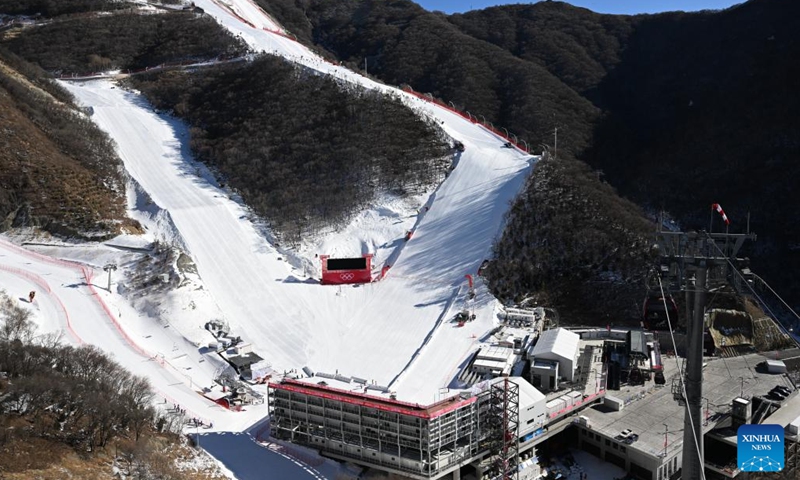
Photo taken on Jan. 28, 2022 shows a view of the National Alpine Skiing Center in Yanqing District, Beijing, capital of China. The National Alpine Skiing Center located in Yanqing is the first Olympic-standard alpine ski venue in China with a maximum vertical drop of about 900 meters. The center is set to host the Alpine skiing competitions at Beijing 2022.Photo:Xinhua
As the Beijing 2022 Winter Olympics are just a few days away and Olympic venues welcome athletes from around the world, CNN dug out an ancient topic to hype the so-called environmental damage caused by the Games' ski venues in Beijing's Yanqing district, despite that such a rumor had been clarified by authorities as early as seven years ago.
The CNN report published on Saturday raised clichés claiming Beijing built a ski resort in its suburban Yanqing district in the middle of a nature reserve, which it claims threatens the local ecosystem.
A working staff from the Songshan National Nature Reserve in Yanqing district, speaking in anonymity, told the Global Times on Saturday that the ski venues for the Beijing 2022 Winter Olympics are not inside the nature reserve. More and more wild species of animals and birds have also appeared near Yanqing's competition venues, according to the local people.
Since 2019, wild animals such as wild boars and badgers have been detected around the Yanqing competition venue. At present, there are over 450 species of terrestrial wildlife in Yanqing district, according to media reports.
Zhang Suzhi, then executive deputy head of Yanqing, told media in 2015 that the boundaries of the Songshan National Nature Reserve were adjusted to expand the area of the reserve for better protection of species. After the adjustment, the nature reserve covers a total area of 6,123 hectares, 31 percent larger than the original area, Zhang said, saying that the Olympic venues did not fall in the reserve after the adjustment.
After adjustment, plant species covered in the reserve increased from 20 to 29, and wild plant species increased by eight species in two genera, according to Zhang. Zhang also stressed the principles in adjustment, including ensuring that major protected species will not be affected and maintaining the ecosystem integrity.
The ecological environment is relatively complex as the core area of the Yanqing competition venue is among mountains and basins, according to media reports. An expert team with 18 experts and professors has conducted a background survey of animal and plant resources in the competition area and its surrounding areas of 2,000 hectares, supervising and guiding the ecological restoration work in this area during Beijing 2022.
Yu Bo, head of Yanqing district in Beijing, said this January that ecological restoration has been completed in the Yanqing competition area, covering an area of 2.14 million square meters, according to Shanghai Observer.
The ecological restoration mainly includes the slope and other exposed areas caused by temporary land occupation and road construction, according to media reports.
The Yanqing competition area has built five on-site protection areas, in situ protection of 313 trees; two near-field protection areas have been established with 11,000 shrubs transplanted nearby, according to the report.
All venues of Beijing 2022, including Yanqing venues, will be powered by green electricity. "It will leave a very good legacy that will facilitate Beijing's low-carbon transition," Ma Jun, founder of the Institute of Public and Environmental Affairs, told the Global Times on Saturday.
Even in Western countries, they also need to use artificial ice and snow in the sports, Ma said, noting that Beijing 2022 gives some inspiration to the global ice and snow industry on their efficient use.
The 2022 Beijing Winter Olympics will be held from February 4 to February 20 in Beijing and neighboring city Zhangjiakou, in North China's Hebei Province.
Global Times




